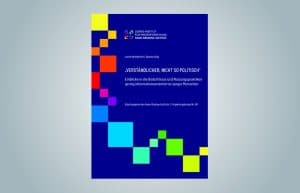Immer mehr Jugendliche und junge Erwachsene finden ihre Interessen und Anliegen in den klassischen Nachrichtenmedien nicht wieder. Sie haben nur ein geringes Interesse am aktuellen Weltgeschehen, nutzen kaum Informationsangebote etablierter Medien und werden daher mit journalistischen Angeboten kaum noch erreicht. Stattdessen spielen Angebote in Sozialen Medien eine wichtige Rolle für diese Gruppe junger Menschen. Sie bleiben fast ausschließlich über beiläufige Informationskontakte bei TikTok und YouTube auf dem Laufenden, bevorzugen unterhaltende Inhalte und verfolgen dabei individuelle Interessen, über die sie auch im Freundeskreis sprechen.
Wie ihre Informationsbedürfnisse, Nutzungspraktiken und Einstellungen aussehen, hat das Leibniz-Institut für Medienforschung in Hamburg in Gesprächsrunden mit „gering Informationsorientierten“ erforscht.
 Im Fokus der hier veröffentlichten Teilstudie des Projekts „UseTheNews – Nachrichtennutzung und Nachrichtenkompetenz im digitalen Zeitalter“ standen junge Menschen, die sich kaum für aktuelle Informationen interessieren und mit journalistischen Angeboten nicht erreicht werden: die gering Informationsorientierten. Hierzu wurden im Sommer 2023 in vier Großstädten in Deutschland zehn Fokusgruppen (n=46) mit solchen Jugendlichen und jungen Erwachsenen geführt, die sich aufgrund ausgewählter soziodemografischer Merkmale der Gruppe der GIO zurechnen lassen. Die Fokusgruppen fanden in den Städten Hamburg, Bottrop (Nordrhein-Westfalen), Dresden (Sachsen) und Nürnberg (Bayern) statt.
Im Fokus der hier veröffentlichten Teilstudie des Projekts „UseTheNews – Nachrichtennutzung und Nachrichtenkompetenz im digitalen Zeitalter“ standen junge Menschen, die sich kaum für aktuelle Informationen interessieren und mit journalistischen Angeboten nicht erreicht werden: die gering Informationsorientierten. Hierzu wurden im Sommer 2023 in vier Großstädten in Deutschland zehn Fokusgruppen (n=46) mit solchen Jugendlichen und jungen Erwachsenen geführt, die sich aufgrund ausgewählter soziodemografischer Merkmale der Gruppe der GIO zurechnen lassen. Die Fokusgruppen fanden in den Städten Hamburg, Bottrop (Nordrhein-Westfalen), Dresden (Sachsen) und Nürnberg (Bayern) statt.
Studie zum Download
Wunderlich, Leonie; Hölig, Sascha (2023): „Verständlicher, nicht so politisch“ – Einblicke in die Bedürfnisse und Nutzungspraktiken gering informationsorientierter junger Menschen. Hamburg: Verlag Hans-Bredow-Institut, Oktober 2023 (Arbeitspapiere des Hans-Bredow-Instituts | Projektergebnisse Nr. 69), https://doi.org/10.21241/ssoar.90067, ISBN 978-3-87296-183-9 (Open Access, lizenziert unter einer Creative Commons Namensnennung 4.0 International Lizenz CC BY 4.0).

